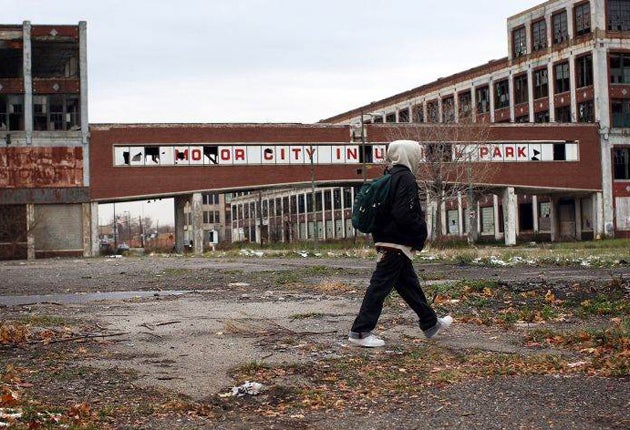A modern-day Pompeii? The exodus from Motor City

Your support helps us to tell the story
From reproductive rights to climate change to Big Tech, The Independent is on the ground when the story is developing. Whether it's investigating the financials of Elon Musk's pro-Trump PAC or producing our latest documentary, 'The A Word', which shines a light on the American women fighting for reproductive rights, we know how important it is to parse out the facts from the messaging.
At such a critical moment in US history, we need reporters on the ground. Your donation allows us to keep sending journalists to speak to both sides of the story.
The Independent is trusted by Americans across the entire political spectrum. And unlike many other quality news outlets, we choose not to lock Americans out of our reporting and analysis with paywalls. We believe quality journalism should be available to everyone, paid for by those who can afford it.
Your support makes all the difference.Long battered Detroit has suffered a new blow, with the release of the 2010 census showing its population shrunk by 25 per cent over the last decade, equivalent to one person leaving the city every 20 minutes.
Little more than half a century ago, the Motor City was the fifth largest in the country, behind New York, Chicago, Los Angeles and Philadelphia. Now, as home officially to only 713,777 souls – less than half the total in its heyday – Detroit barely scrapes into the top 20 of America's largest cities, behind such upstarts as San Jose, California and Columbus, Ohio. Among major US cities, only New Orleans showed a greater percentage decline, almost exclusively due to Hurricane Katrina in 2005.
The latest figures were a shock to city authorities, who had been expecting something closer to 800,000. Claiming that censuses frequently undercounted urban populations, Dave Bing, Detroit's mayor, announced a challenge to return – not least because a smaller city would mean less funding by the federal government.
Even so, the decline confirms the city's woes: the crisis of the car industry and the loss of manufacturing jobs that depended on it, an inexorable decline in inner city schools, police and other services.
Vast swathes of the eastern part of the city lie abandoned, gradually reverting to nature like a modern-day industrial Pompeii. Last year, Mr Bing released a report proposing that sections of Detroit be returned to farmland and open space. If the plan goes ahead, it would amount to, according an expert, "the first organised and orderly deconstruction of a major American city."
Join our commenting forum
Join thought-provoking conversations, follow other Independent readers and see their replies
Comments